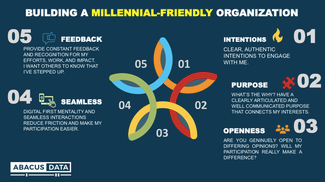Adapting to the millennial age
Within the next few years, millennials will make up the largest cohort of working-age Canadians. It is therefore more critical than ever that business owners, and especially construction-business owners and managers, understand what motivates millennials, and adapt their working conditions to suit this new generation.
 That was the message delivered by David Coletto, president of Abacus Data, at the Ottawa Construction Association’s (OCA’s) annual Chairman’s Reception on November 7. In his presentation, How to Survive or Thrive in the Millennial Age, Coletto described some of the factors that have influenced millennials’ habits and thinking, and made the case that these young workers are not that different from other generations, but that they want to be listened to and respected.
That was the message delivered by David Coletto, president of Abacus Data, at the Ottawa Construction Association’s (OCA’s) annual Chairman’s Reception on November 7. In his presentation, How to Survive or Thrive in the Millennial Age, Coletto described some of the factors that have influenced millennials’ habits and thinking, and made the case that these young workers are not that different from other generations, but that they want to be listened to and respected.
“There are an estimated 9.5 million millennials in Canada today,” Coletto explained. “That’s about 27 percent of the population. These people are tach savvy. They are diverse. They are well educated, and they are entrepreneurial. Besides this, they want may of the same things the rest of the population does. They want to get married, start a family and buy a home—just maybe not in the order other generations have.”
The number-one thing millennials want from their jobs or careers today is to matter, Coletto explained. During their upbringings, most enjoyed flat family hierarchies. They were invited to give opinions about important family decisions. They were protected, and they were told that they could achieve anything. As a result, they hold the belief that they can take any job that they want, and if they don’t like it, they will move on.
Millennials are also self-conscious. A life lived with technology has made them expect instant reactions to behaviours. As well, instant reactions and referrals causes them to worry about how their actions will be perceived by others. These two points are critical in the working world, said Coletto.
“Just as millennials were given input into family decisions, they want to be heard in discussions about major decisions at work, and they want feedback about the work they’re doing. They expect these things,” he said. “They also don’t like things to be unscheduled. Don’t call them They work best when work is appointment based.”
So how can construction make itself more millennial friendly? Coletto advised business owners to ask a key question about the companies they run, “what does this job say about who I am?”. Perception is everything for millennials. To remain in a company, they have to know others will have strong opinions of the work they are doing.
Coletto then listed a series of follow-up questions that touched on notions such as the sincerity and clarity of the company’s purpose, whether ideas and opinions are welcomed among company leaders, to what extent is the company digital friendly (or digital first), and whether the company provides individual feedback and recognition regularly.
“The old notion that people work for a boss isn’t valid any more,” said Coletto. “Millennials will say they work with people rather than for them. That’s a critical idea. Giving someone a job isn’t viewed as a privilege to millennials. It’s a privilege for your company to have millennials as workers, and you have to do everything you can to keep them engaged and make them feel valued.”







